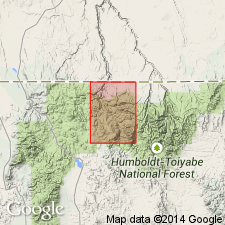
- Usage in publication:
-
- Young America Gravel
- Modifications:
-
- Named
- Dominant lithology:
-
- Quartzite
- Rhyolite
- Granite
- AAPG geologic province:
-
- Great Basin province
Summary:
Pg. 23-24, pI. 1 (geol. map). Young America Gravel. Poorly sorted sands, and subrounded to rounded pebbles and cobbles of Prospect Mountain(?) quarztite, Jarbidge rhyolite, and granite. Gravels were deposited on an erosion surface that was formed after the extrusion and subsequent deformation of Jarbidge Rhyolite. The gravels lie between Miocene Jarbidge Rhyolite and early Pliocene Idavada Volcanics, so although no direct fossil dating is known, the age of the gravels is fairly well defined. Age is Miocene.
Erosion surface is best exhibited between Tennessee Mountain and Pine Mountain, where a high flat divide developed on granitic rock, metamorphosed limestone, and quartzite, separates the southern and northern drainage of Rowland quadrangle, Elko Co., northern NV. Origin of name not stated.
Source: US geologic names lexicon (USGS Bull. 1350, p. 843).
For more information, please contact Nancy Stamm, Geologic Names Committee Secretary.
Asterisk (*) indicates published by U.S. Geological Survey authors.
"No current usage" (†) implies that a name has been abandoned or has fallen into disuse. Former usage and, if known, replacement name given in parentheses ( ).
Slash (/) indicates name conflicts with nomenclatural guidelines (CSN, 1933; ACSN, 1961, 1970; NACSN, 1983, 2005, 2021). May be explained within brackets ([ ]).

